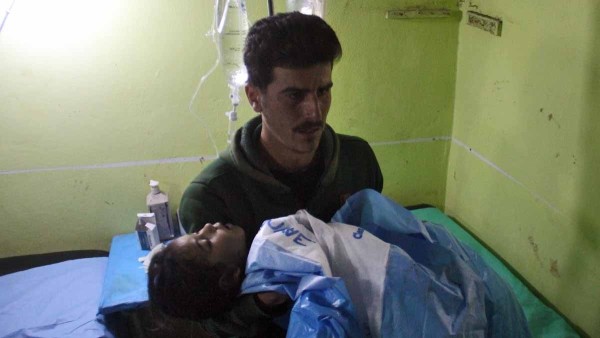US says it will “shut down the financial networks of all individuals involved with the production of chemical weapons used to commit these atrocities”
LATEST
- Turkish Airstrikes on Kurdish Militia Positions in Northeast
- Regime Suspends Passport Renewals of Syrians Outside Country
The US has sanctioned 271 employees of an Assad regime agency that develops chemical weapons, three weeks after the regime’s use of a nerve agent killed at least 93 people in northwest Syria.
The US Treasury imposed the restrictions on the staff of the Scientific Studies and Research Center, saying that some of those blacklisted had worked on the chemical weapons program for more than five years. The sanctions order American banks to freeze assets and bars US companies from transactions.
Treasury Secretary Stephen Mnuchin said Washington would “relentlessly pursue and shut down the financial networks of all individuals involved with the production of chemical weapons used to commit these atrocities.”
Israeli warplanes struck the SSRC in January 2013. The Obama Administration sanctioned people and companies in July 2016 for supporting the Center, and on January 12, the Treasury blacklisted six SSRC officials.
The Assad regime was ordered to hand over all chemical stocks and dismantle facilities after its August 2013 sarin attacks near Damascus that killed more than 1,400 people; however, international agencies say the regime has retained a small amount of chemical agents. Last week an Israeli official estimated the amount at three tons.
On April 4, a regime Su-22 jet fighter fired a missile with a hybrid of chlorine and “sarin or a sarin-like substance”, according to the Organization for the Prohibition of Chemical Weapons, on Khan Sheikhoun in Idlib Province. An estimated 87 civilians were immediately killed, and six subsequently killed in Turkish hospitals. Almost 600 people were injured.
Three days later, two US warships fired 59 Tomahawk missiles on the Shayrat airbase, from where the Su-22 took off with the chemical munitions. It was the first direct American airstrike on an Assad regime position in Syria’s 73-month conflict.
The US has not taken any further military action, including an attempt to limit Russian and regime conventional bombing which is responsible for the majority of more than 200,000 civilian deaths in the conflict. Since April 7, Russia has escalated attacks, including with incendiary and thermobaric munitions, on Idlib, northern Hama, and western Aleppo Provinces.
See Syria Daily, April 24: Russia Destroys Last Hospital in Southern Idlib
Syria Daily, April 23: Russian Bombing Enables Pro-Assad Advance in Northern Hama
Journalist Hadi al-Abdallah reports on a pro-Assad airstrike on Monday that killed at least five people and wounded dozens in a vegetable market in Khan Sheikhoun:
A report on displaced people from Khan Sheikhoun in a camp on the Turkish-Syrian border:
TOP PHOTO: A father holds his child, killed by an Assad regime chemical attack on Khan Sheikhoun in northwest Syria, April 4, 2017
Turkish Airstrikes on Kurdish Militia Positions in Northeast
The Turkish military says it has carried out airstrikes on positions of the Kurdish militia YPG in northeastern Syria.
A YPG spokesman, Redur Xelil, says 20 fighters were killed and 18 wounded, three seriously.
The Turkish statement framed the strikes as part of attacks against the Turkish Kurdish insurgency PKK near the Sinjar mountains in northeast Syria. It said the operations were to prevent the movement of weapons and explosives for attacks inside Turkey.
Ankara considers the Syrian Kurdistan Democratic Party (PYD) and its YPG militia as part of the PKK, which has battled Turkish security forces for more than 30.
The Turkish army said the warplanes struck about 2 a.m. local time (2300 GMT):
To destroy these terror hubs which threaten the security, unity and integrity of our country and our nation and as part of our rights based on international law, air strikes have been carried out…and terrorist targets have been struck with success.
Regime Suspends Passport Renewals of Syrians Outside Country
The Assad regime has suspended the renewal of passports of Syrians now outside the country.
Embassies and consulates in Turkey, Jordan, and Sudan immediately halted processing of renewals, affecting more than 3.7 million refugees in those countries.
No reason was given, and there was no apology to those affected. The embassies in Jordan and Sudan said the suspension was “until further notice.”

